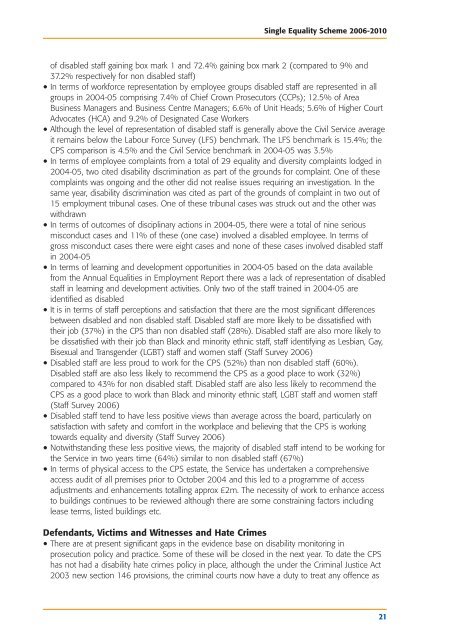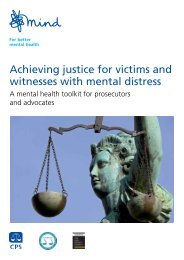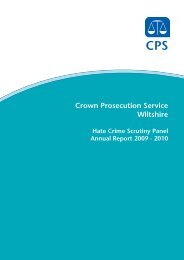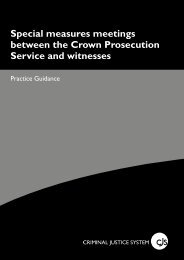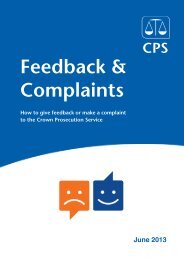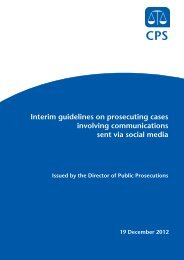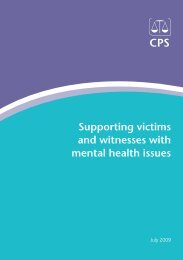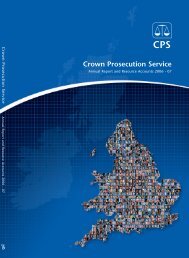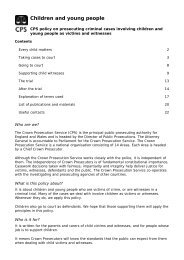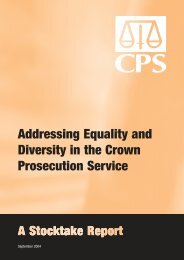Single Equality Scheme 1 12pt - Crown Prosecution Service
Single Equality Scheme 1 12pt - Crown Prosecution Service
Single Equality Scheme 1 12pt - Crown Prosecution Service
Create successful ePaper yourself
Turn your PDF publications into a flip-book with our unique Google optimized e-Paper software.
<strong>Single</strong> <strong>Equality</strong> <strong>Scheme</strong> 2006-2010<br />
of disabled staff gaining box mark 1 and 72.4% gaining box mark 2 (compared to 9% and<br />
37.2% respectively for non disabled staff)<br />
5 In terms of workforce representation by employee groups disabled staff are represented in all<br />
groups in 2004-05 comprising 7.4% of Chief <strong>Crown</strong> Prosecutors (CCPs); 12.5% of Area<br />
Business Managers and Business Centre Managers; 6.6% of Unit Heads; 5.6% of Higher Court<br />
Advocates (HCA) and 9.2% of Designated Case Workers<br />
5 Although the level of representation of disabled staff is generally above the Civil <strong>Service</strong> average<br />
it remains below the Labour Force Survey (LFS) benchmark. The LFS benchmark is 15.4%; the<br />
CPS comparison is 4.5% and the Civil <strong>Service</strong> benchmark in 2004-05 was 3.5%<br />
5 In terms of employee complaints from a total of 29 equality and diversity complaints lodged in<br />
2004-05, two cited disability discrimination as part of the grounds for complaint. One of these<br />
complaints was ongoing and the other did not realise issues requiring an investigation. In the<br />
same year, disability discrimination was cited as part of the grounds of complaint in two out of<br />
15 employment tribunal cases. One of these tribunal cases was struck out and the other was<br />
withdrawn<br />
5 In terms of outcomes of disciplinary actions in 2004-05, there were a total of nine serious<br />
misconduct cases and 11% of these (one case) involved a disabled employee. In terms of<br />
gross misconduct cases there were eight cases and none of these cases involved disabled staff<br />
in 2004-05<br />
5 In terms of learning and development opportunities in 2004-05 based on the data available<br />
from the Annual Equalities in Employment Report there was a lack of representation of disabled<br />
staff in learning and development activities. Only two of the staff trained in 2004-05 are<br />
identified as disabled<br />
5 It is in terms of staff perceptions and satisfaction that there are the most significant differences<br />
between disabled and non disabled staff. Disabled staff are more likely to be dissatisfied with<br />
their job (37%) in the CPS than non disabled staff (28%). Disabled staff are also more likely to<br />
be dissatisfied with their job than Black and minority ethnic staff, staff identifying as Lesbian, Gay,<br />
Bisexual and Transgender (LGBT) staff and women staff (Staff Survey 2006)<br />
5 Disabled staff are less proud to work for the CPS (52%) than non disabled staff (60%).<br />
Disabled staff are also less likely to recommend the CPS as a good place to work (32%)<br />
compared to 43% for non disabled staff. Disabled staff are also less likely to recommend the<br />
CPS as a good place to work than Black and minority ethnic staff, LGBT staff and women staff<br />
(Staff Survey 2006)<br />
5 Disabled staff tend to have less positive views than average across the board, particularly on<br />
satisfaction with safety and comfort in the workplace and believing that the CPS is working<br />
towards equality and diversity (Staff Survey 2006)<br />
5 Notwithstanding these less positive views, the majority of disabled staff intend to be working for<br />
the <strong>Service</strong> in two years time (64%) similar to non disabled staff (67%)<br />
5 In terms of physical access to the CPS estate, the <strong>Service</strong> has undertaken a comprehensive<br />
access audit of all premises prior to October 2004 and this led to a programme of access<br />
adjustments and enhancements totalling approx £2m. The necessity of work to enhance access<br />
to buildings continues to be reviewed although there are some constraining factors including<br />
lease terms, listed buildings etc.<br />
Defendants, Victims and Witnesses and Hate Crimes<br />
5 There are at present significant gaps in the evidence base on disability monitoring in<br />
prosecution policy and practice. Some of these will be closed in the next year. To date the CPS<br />
has not had a disability hate crimes policy in place, although the under the Criminal Justice Act<br />
2003 new section 146 provisions, the criminal courts now have a duty to treat any offence as<br />
21


